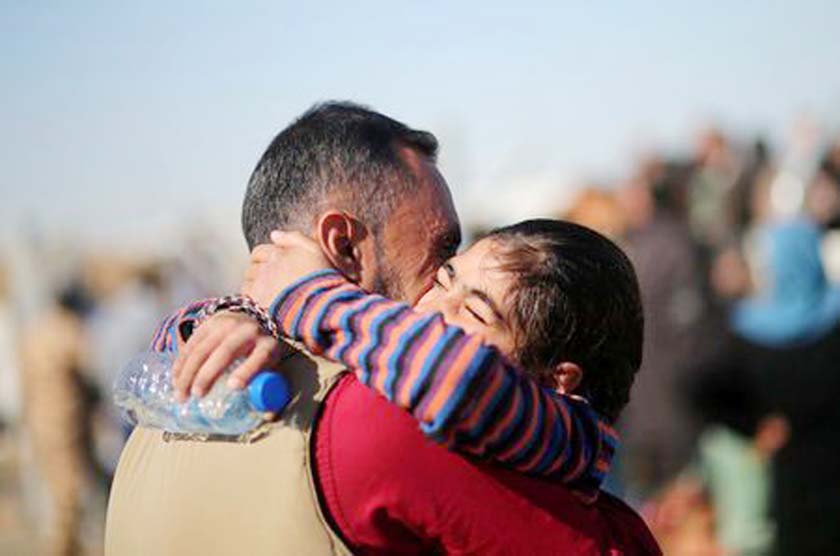
Reuters, Baghdad :
The United Nations said on Tuesday there were indications that poorer families in Mosul are struggling to feed themselves as food prices increase following the U.S.-backed offensive on the Islamic State-held city in northern Iraq.
“Key informants are telling us that poor families are struggling to put sufficient food on their tables,” U.N Humanitarian Coordinator in Iraq, Lise Grande, told Reuters. “This is very worrying.”
Iraqi government and Kurdish forces surround the city from the north, east and south, while Popular Mobilisation forces – a coalition of Iranian-backed Shi’ite groups – are trying to close in from the west. Last week the Popular Mobilisation forces cut off the supply route to Mosul from Islamic State-held territory in Syria.
“In a worst case, we envision that families who are already in trouble in Mosul will find themselves in even more acute need.” Grande said. “The longer it takes to liberate Mosul, the harder conditions become for families.”
Six weeks after the launch of the offensive, Iraqi forces moving from the east have captured about a quarter of the city, trying to advance to the Tigris river that runs through its center. A U.S.-led coalition is providing air and ground support to the offensive that started on Oct. 17.
Until three weeks ago, many of Abu Osama’s customers were Islamic State militants who brought their wives and children to his pharmacy on the eastern edge of Mosul for injections and treatment.
Now, most of them are Iraqi security forces who recaptured the Gogjali neighborhood earlier this month and are pushing further into the city, which has been under Islamic State control for more than two years.
As the militants retreat, civilians are adjusting to a new reality in their wake and a clearer picture is emerging of what they did to survive the punishments and deprivation of Islamic State rule.
“Whether Daesh (Islamic State) or army: my door is open to everyone,” said Abu Osama, taking the blood pressure of an Iraqi policeman. “If my worst enemy comes here, I must treat him.”
Several Islamic State militants, both local and foreign, lived in Gogjali and it was mainly their families that visited the pharmacy because the militants themselves were often away, Abu Osama said.
The front of his shop and those next door are marked with the Arabic letter “z” for zakat, meaning alms, and beside it an identification number Islamic State bureaucrats assigned to record donations made at the shop for their self-proclaimed caliphate.
Advancing Iraqi forces have sprayed Shi’ite slogans over it.
The 40-year old opened the pharmacy after Mosul fell to Islamic State and the salary he received as an employee of the Iraqi health ministry was cut by the government as it sought to choke off funding to the militants, who were skimming the pay of public sector workers in areas they controlled.
The militants wanted Abu Osama to work for them in a hospital, but he refused because it would have meant pledging allegiance to the group, and he does not agree with their hardline ideology.
According to that ideology, the depiction of living creatures is un-Islamic because it can lead to idolatry. After a militant upbraided him for displaying a poster with an image of a baby on the wall of his pharmacy, Abu Osama blotted out its eyes with a black marker pen and then did the same to every label featuring a human being.
The 500 dinar note ($0.40), which bears an image of a statue, was banned for the same reason, according to several civilians.
All medicine came from Syria-Mosul’s only outlet to the world as an array of forces slowly closed in on the city in Iraq. Syrian traders imported cheap Chinese and Indian medicine via Turkey and paid Islamic State a tax to bring it to market in Mosul, Abu Osama said.
By the time medicine reached his still sparsely stocked shelves, the price had tripled, and many of his customers could not afford to buy it, so he sold it to them on credit and is now owed 1.25 million Iraq dinars ($1,016).
Since women were obliged by Islamic State to veil their faces completely, Abu Osama cannot be sure who owes him what, he said.
Standing in the pharmacy, forty-three-year old Sohaib commented that if he became separated from his wife in a crowded marketplace, she would have to find him, as he could not distinguish her from all the other women shrouded from head to toe in black.
Abu Osama could treat women only when they were accompanied by a male relative, and if a female patient lifted her veil before him and Islamic State’s vice squad found out, he would be held accountable. It never happened to him, but the militants punish such infractions with fines and whipping.
Residents of Gogjali said Islamic State’s laws were less strictly enforced there because it is far from the city center.
When Iraqi special forces took the neighborhood, two of the militants left their wives behind, locals said, identifying the women as Russian. The jihadi brides tried to flee Mosul among displaced civilians but were found out and detained by Iraqi security forces, according to a soldier sitting in the pharmacy.
“They were unbelievably beautiful,” he said.

